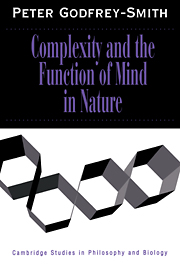5 - On construction
Published online by Cambridge University Press: 05 June 2012
Summary
Asymmetric externalism
In this chapter we will look at a critically important issue, which marks what I view as the most important divide between Spencer's version of the environmental complexity thesis and Dewey's version. This issue is the role played by organic systems, such as intelligent agents, in the construction of their environments.
Up to this point we have been primarily concerned with different approaches to explaining organic properties, and with the idea that cognition, a form of organic complexity, might be understood in terms of its relations to environmental conditions. Our perspective has been “outside-in.” In this chapter we will look down this same road from the other direction; we will look at explanations of environmental properties in terms of organic properties. The direction of influence we are concerned with now is “inside-out.”
We will approach these questions, as we did in Chapter 2, by looking first at the relationships between some basic explanatory schemas, and describing a range of disputes in different fields in terms of this categorization.
In Chapter 2 I distinguished three basic types of explanation: externalist, internalist and constructive. Externalist explanations explain internal properties of organic systems in terms of environmental properties. Internalist explanations are explanations of one set of internal properties in terms of another, and constructive explanations explain environmental properties in terms of organic properties. Some externalist explanations are c-externalist: they are externalist explanations where explanandum and explanans are both properties of complexity.
- Type
- Chapter
- Information
- Complexity and the Function of Mind in Nature , pp. 131 - 165Publisher: Cambridge University PressPrint publication year: 1996

